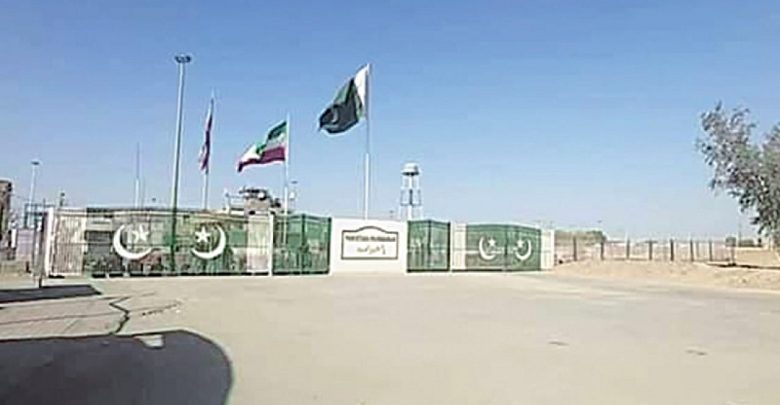The people of Balochistan have learned self-sustenance over decades of experiencing state apathy and indifference. They have ceased to rely on the state, perceiving it as lethargic in its efforts to support its citizens.
Believing that they must construct everything from the ground up, the Baloch people have embraced self-reliance for their basic necessities and income.
A prime illustration of this ethos is the Gabd Rimdan-250 border point, situated between Pakistan and Iran. Once an arid expanse with minimal signs of life, it has now transformed into a thriving trade center

Local Entrepreneurs Transform Gabd into Thriving Trade Hub Amid Uncertainties
Local traders, who poured their effort and dedication into its establishment, have turned this once desolate area into a significant source of revenue for the state.
This border crossing, an official route between the two nations, lies approximately 120km east of Iran’s Chabahar port and 70km west of Gwadar port.
Locals state that after painstakingly transforming an abandoned crossing into a thriving trade hub, they now expect that others will aim to benefit from their efforts.
Positioned between Rimdan in Iran’s Sistan province and Gabd in Pakistan’s Gwadar district, the border point was formally inaugurated in 2020.
However, residents of Gabd and adjacent areas in Makran have actively involved in trade and business activities here, well before its official opening.
“In the past, Gabd used to be a backward and distant border point,” Shamsul Haq, the president of the Gwadar Chamber of Commerce and Industry, recalled.
“When trade started, local businessmen developed the border point and everything else on their own so that business could thrive.”
Baboo Gulab also remembers Gabd as a deserted area a decade ago. It lacked metalled roads and other facilities.
A local trader named the late Waja Bakhshullah Hoth, along with other residents, initially initiated trade through the border.
Their efforts paved the way for more businesses to set up in the area, as stated by Mr. Gulab. He is also the former district chairman of Gwadar.
He said, “Now people have made big investments by constructing warehouses for imports and exports.”
Facing Complete Loss
Like Mr. Haq and Mr. Gulab, other local traders also enthusiastically discuss the transformation of the border area. However, their conversational tone reveals a hint of worry regarding a potential threat to their livelihood.
The National Logistics Cell (NLC), operated by the army, recently obtained 72 acres of land for constructing warehouses and establishing a trade center in Gabd.
In conversations with Dawn, traders expressed that they have not received proper attention regarding this development, and their concerns remain unaddressed.
They are apprehensive that the formidable resources of the NLC might lead to a monopoly in trade operations in Gabd. This could severely impact their businesses, or even result in their closure.
“We have many reservations over the arrival of NLC,” said Hanif Nigori, a local of Gwadar.
He further claimed, “We, the locals and traders, will be jobless. Moreover, NLC has not paid the locals the cost of acquiring their lands.”
Another Gwadar resident, Abdul Hakim Baloch, stated that if NLC established its warehouses, it would affect the local market, which would have dire consequences for Gwadar residents.
“Thanks to local traders there are facilities and economic activities in Gabd which are benefiting us. But this all can come to a halt after the arrival of NLC.”
Revenue spinner
Locals claim the border crossing has turned into a revenue spinner. The authorities want to a share in the dividends.
Mr Gulab said, “Locals planted a tree two decades ago and when it started giving fruits, everyone came to claim a reward.”
A local trader asserted that the border crossing yielded more than Rs1.9 billion in revenue during June and over Rs1.3 billion in July.
A Customs official based in Gwadar, speaking to Dawn, disclosed that 70% of the total revenue from the Makran division is generated through the border crossing.
The official, choosing to remain anonymous due to media restrictions, shared that in the fiscal year 2022-23, the Gabd-Rimdan border crossing generated revenue of Rs33.292 billion, surpassing the annual target by 137%.
Locals are apprehensive that the NLC could claim a significant portion of the revenue, leaving them with meager earnings and undermining their decades of hard work.
However, the NLC contends that these concerns are baseless. Muhammad Ibrar, NLC’s manager at the border crossing, confirmed that the company has appropriately compensated locals for the 72 acres of land acquired for terminal construction.
Ibrar stated, “Over the past 15 or 20 years, local traders have benefited from trade and warehouses.” He dismissed local concerns about potential unemployment after the NLC’s arrival, asserting that there will actually be more job opportunities.
He further mentioned that the NLC has conveyed local traders’ reservations to higher authorities.
In recent times, Gwadar has witnessed widespread discontent among locals who claim their resources have been exploited without benefiting them. Over the past two years, two major protests have taken place, with locals asserting that instead of addressing their issues, the government has exacerbated their difficulties.



1 Comment
Gwadar local traders & 250 gabd Custom border involve in Tax evasion like halve duty & no GD clearence. They are very selfish for themselves nothing care about local Gwadar. They know very well after coming NLC their Black business get shut down.
Thanks NLC for coming to 250 Border.